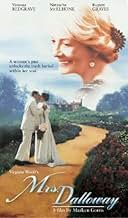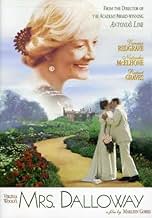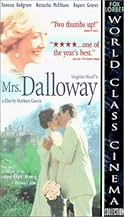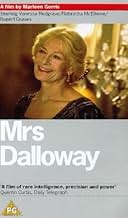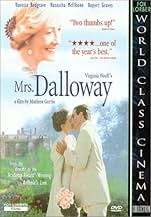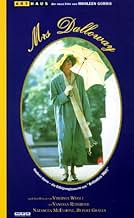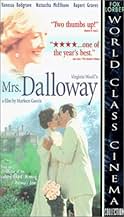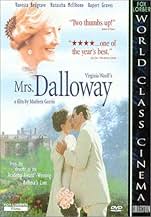Mrs Dalloway
- 1997
- Tous publics
- 1h 37m
IMDb RATING
6.5/10
4.5K
YOUR RATING
In 1923 London, socialite Clarissa Dalloway's well-planned party is overshadowed by the return of an old suitor she had known thirty-three years earlier.In 1923 London, socialite Clarissa Dalloway's well-planned party is overshadowed by the return of an old suitor she had known thirty-three years earlier.In 1923 London, socialite Clarissa Dalloway's well-planned party is overshadowed by the return of an old suitor she had known thirty-three years earlier.
- Director
- Writers
- Stars
- Awards
- 2 wins & 1 nomination total
- Director
- Writers
- All cast & crew
- Production, box office & more at IMDbPro
Featured reviews
Kudos go to all who participated in making this wonderful film. Vanessa Redgrave, as usual, is perfect as an aging dowager who settled for the "safe" path in life instead of seeking adventure and taking risks. When her old flame reappears, she reevaluates her choices and second-guesses the paths that she chose. The film also has a sub-plot about a shell-shocked World War I veteran who is in emotional torment and is inconsolable. The film works on two levels. It shows the interaction between proper British people who speak politely to one another, but the viewer senses that there are fierce and passionate undercurrents and important thoughts that seems to be unspoken. In addition, the film is a clear indictment of the stuffy and snobby British society of Post World War I England, in which a party could be of such importance that a person's reputation could hinge on its success. There is also a feminist slant in the movie. Can a woman who spends her time at home making parties and pleasing her husband ever feel fulfilled? Did Mrs. Dalloway make the right decision in "playing it safe" in life? That is up to the viewer to decide. Meanwhile, revel in the fabulous nuanced performances, the witty dialogue and the beautiful cinematography. This film is a triumph.
I appreciate this film for its technical quality, as well as its ambition in trying to film a novel that is written in the stream of consciousness style, however it fails overall because of Ms. Redgrave's performance. Her acting destroys the tone of the movie in a extremely jarring way; the contrast between her just-swallowed-a-bottle-of-Prozac happiness and the other plot lines and draws the viewer out of the experience of the film. The novel's tone is much darker and Clarissa's point-of- view much more based on regret, and more in sync with the post-traumatic-stress and depression of Septimus and the ennui and disenfranchisement of her daughter. Her performance wasn't only in the wrong tone, but it was incredibly phony; a viewer should never see acting happening. This is the same gripe I have with Rupert Grave's performance of Septimus; his acting is too stagy and I never truly believed him when shouting "EVANS! EVANS!"
Probably will be (and perhaps should be) the last time a film adaptation is made of this novel.
Probably will be (and perhaps should be) the last time a film adaptation is made of this novel.
Virginia Woolf is thought of as a high-brow rather than popular novelist yet the novel this film is based on sold well when first published in 1924. It is easy to see why there is nothing rarefied in the treatment of its themes, making choices and breaking with the past.
Clarissa Dalloway, a society matron, played with startled radiance by Vanessa Redgrave, is throwing a party and while making the arrangements she remembers back to the choice she made 30 years ago as a young woman between two men. One, Peter, charming, intelligent, adventurous, is the sort who went out and conquered India, or at least seduced the Major's wife. The other, Richard, good-looking, loving, a bit boofy, devoid of flair, is the sort that gravitates into politics. Naturally, the young Clarissa (played by Natasha Mc Elhone) has chosen the safe one, but Peter, after a chequered career, has turned up in London and pays her a call. She invites him to the party. Parallel to Clarisa's reminiscences is the story of Septimus (Rupert Graves) a returned soldier from World War I, whose wartime experiences are eating into his sanity.
Clarisa is put up as a `modern woman' who refuses Peter's love because she sees it as all demanding and all consuming, despite his attractive personality. Yet she accepts Richard, who wants and needs a dutiful, supportive wife. She also passes up the possibility of love with her close friend Sally. Though shaken when she hears of Stephen's fate from his psychiatrist, a guest at the party, and touched when she meets her old lovers again, she sees her life as going on before, safe and unexciting.
For a film-maker the amount of interior musing generated by Woolf's `stream of consciousness' writing technique presents a challenge and here Marleen Gorris has effectively used flashback to externalise Clarisa's memories. We get two stories artfully intercut, though there is not much tension in either of them - costumes, but not much drama. One does, however, get the feel of how it might have been to be in the upper class during the Edwardian late summer; as if just being there was enough (we even meet the Prime Minister at the party). Woolf and Gorris have evoked the atmosphere precisely, even if, as Lytton Strachey said, there isn't much of a plot. Even the minor characters sparkle. Robert Hardy as Sewell's psychiatist exudes bonhomie and guile, and Margaret Tyzak as the meddlesome Lady Bruton gives us a fine example of the old-fashioned female power broker at work. Overall, the film is rather slow, especially at the start, and I did wonder whether it would have been made without all the government and foundation money listed in the credits, but the quality of the performances redeem it to some extent.
Clarissa Dalloway, a society matron, played with startled radiance by Vanessa Redgrave, is throwing a party and while making the arrangements she remembers back to the choice she made 30 years ago as a young woman between two men. One, Peter, charming, intelligent, adventurous, is the sort who went out and conquered India, or at least seduced the Major's wife. The other, Richard, good-looking, loving, a bit boofy, devoid of flair, is the sort that gravitates into politics. Naturally, the young Clarissa (played by Natasha Mc Elhone) has chosen the safe one, but Peter, after a chequered career, has turned up in London and pays her a call. She invites him to the party. Parallel to Clarisa's reminiscences is the story of Septimus (Rupert Graves) a returned soldier from World War I, whose wartime experiences are eating into his sanity.
Clarisa is put up as a `modern woman' who refuses Peter's love because she sees it as all demanding and all consuming, despite his attractive personality. Yet she accepts Richard, who wants and needs a dutiful, supportive wife. She also passes up the possibility of love with her close friend Sally. Though shaken when she hears of Stephen's fate from his psychiatrist, a guest at the party, and touched when she meets her old lovers again, she sees her life as going on before, safe and unexciting.
For a film-maker the amount of interior musing generated by Woolf's `stream of consciousness' writing technique presents a challenge and here Marleen Gorris has effectively used flashback to externalise Clarisa's memories. We get two stories artfully intercut, though there is not much tension in either of them - costumes, but not much drama. One does, however, get the feel of how it might have been to be in the upper class during the Edwardian late summer; as if just being there was enough (we even meet the Prime Minister at the party). Woolf and Gorris have evoked the atmosphere precisely, even if, as Lytton Strachey said, there isn't much of a plot. Even the minor characters sparkle. Robert Hardy as Sewell's psychiatist exudes bonhomie and guile, and Margaret Tyzak as the meddlesome Lady Bruton gives us a fine example of the old-fashioned female power broker at work. Overall, the film is rather slow, especially at the start, and I did wonder whether it would have been made without all the government and foundation money listed in the credits, but the quality of the performances redeem it to some extent.
I enjoyed this movie very much, although I really loved the novel a bit more, but that's always the case it seems. Vanessa Redgrave and Natasha McElhone make a GREAT older/younger version of each other, and Rupert Graves gives a stellar performance as a young man dealing with the impact of war. This is a gently told tale, but it's done very well. Worth a look.
While I agree with some of the more perceptive comments made here, I have a few of my own to add. First, the novel on which this film is based is an all-time favorite of mine and I'm happy to have seen it beautifully translated into cinematic form. The contrast between the personal and inner life of an upper class English woman and the horrors produced by war (in this case, symbolized through the experience of one man, brilliantly portrayed) is both moving and exacting. Vanessa Redgrave gives a splendid performance as Clarissa...sensitive, radiant, conservative and uncertain about life decisions as she looks back (nicely depicted in flashback). Michael Kitchen as her would-be lover of old is perfect for the role...quietly romantic, sexy, with just the right British propriety. The troubled young war veteran and his wife are well cast and Marleen Gorris should be credited with graceful directing.
Did you know
- TriviaFirst screenplay written by Eileen Atkins.
- GoofsIn the flashback scenes with the younger actors, Peter is slightly taller than Clarissa. When they dance together at the party, he is considerably shorter than her.
- Quotes
Peter Walsh: [Talking about Clarissa in 1923] She broke my heart, and you can't love like that twice.
- SoundtracksTime for Old Time
Composed by Jack Trombey (as J. Trombey)
- How long is Mrs Dalloway?Powered by Alexa
Details
- Release date
- Countries of origin
- Language
- Also known as
- Virginia Woolf's Mrs Dalloway
- Filming locations
- Duke of York Column, St James's, London, England, UK(Mrs Dalloway coming back from shopping flowers)
- Production companies
- See more company credits at IMDbPro
Box office
- Gross US & Canada
- $3,309,421
- Opening weekend US & Canada
- $90,127
- Feb 22, 1998
- Gross worldwide
- $3,309,421
- Runtime
- 1h 37m(97 min)
- Color
- Sound mix
- Aspect ratio
- 1.85 : 1
Contribute to this page
Suggest an edit or add missing content


